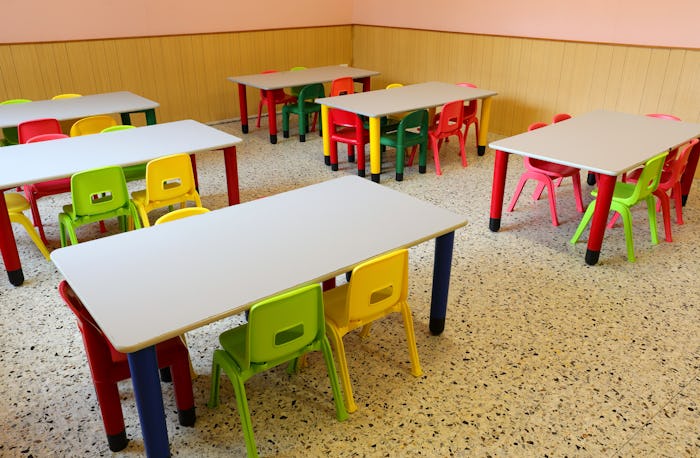Life

Here's How To Talk To Your Child About School Closing During The Pandemic
Schools around the country have shuttered their doors to prevent the spread of the coronavirus. With social distancing the new norm, the decision to close schools makes absolute sense, but so many children are confused, upset, and anxious about the situation. With school out for the foreseeable future, parents need to know how to talk to kids about school closings.
Laura Gray, Ph.D., a clinical psychologist at Children's National Hospital tells Romper that the first step is to explain to your kids why schools are closing. She says that you can simply tell kids that avoiding large crowds helps slow the spread of this virus. She recommends saying something along the lines of, "Schools are closing so kids are not in large groups every day and to help slow down the spread of COVID-19. Staying home from school helps to keep other people healthy."
At first, it was pretty easy to tell my son he was on an "extended spring break" when their school was shut down for just one week. With the timetable now stretching far beyond this, I have to sit my kindergartener down and explain why he can't go back to school for a while — a daunting thought for my little social butterfly — and I know he's going to have some big feelings.
"Let kids know that it is OK to feel sad, frustrated, and disappointed that they are missing school and other school/community events," Gray tells Romper. "Encourage them to talk about their emotions." Gray also notes that some kids may prefer to draw how they are feeling.
A bit of reassurance and structure goes a long way when it comes to keeping kids calm despite the growing panic of the adults around them — school officials included.
Gray tells Romper that your kids should follow a daily routine that includes completing school work and educational activities. Additionally, you can supplement their educational needs with online resources and plenty of activities at home to keep their minds working despite school closures.
A school closing can be hard for kids to wrap their minds around. A daily routine can help, but experts agree that you should add some fun into the mix as well. "Come up with new goals while you are home, such as building that LEGO set you always wanted, or doing a painting mural or mosaic together," family therapist Belina Fruitman tells Romper. "Come up with new ideas that are fun and interesting while you are home."
To help your kids focus on the positives about school being out, Gray suggests encouraging them to think about things they might not typically get to do, like learning to cook or showing off their soccer skills mid-day. Another way she says to help kids focus on the positives is daily gratitude. "Consider starting a family 'Gratitude Wall' to write down things everyone is grateful for each day during this break from school," Gray says.
Fruitman explains that even working parents can help their child start on a project and then let them finish it out on their own. She says that parents can tell their kids that they should try to "make the most out of this" situation because "one day years down the road we will reflect on this and remember what we did with our time at home."
Experiencing worry about the wellbeing of their teachers and friends while schools are closed can also happen. "First and foremost, validate your child’s fears," Fruitman tells Romper. "At any age we all want validation. From there, reassure your child that we are grateful to live in a country with excellent medical care."
Gray tells Romper that parents can remind kids that children are not typically at high risk for COVID-19, that most people who do get it only experience mild symptoms, and that staying home from school is one way to help keep everyone healthy.
If your child experiences stress or worry due to school closures, Fruitman suggests telling them stories about past generations who overcame hardships such as the Great Depression. "Parents can draw comparisons to those times and how we persevered," she tells Romper. "Children love good story tellers."
Additionally, Fruitman says you can talk about past challenges your family has faced and how you got through them together to reassure your child. "Express that some things are scary, but when we face them, we can become stronger," she says.
If you think you’re showing symptoms of coronavirus, which include fever, shortness of breath, and cough, call your doctor before going to get tested. If you’re anxious about the virus’s spread in your community, visit the CDC for up-to-date information and resources, or seek out mental health support. You can find all of Romper’s parents + coronavirus coverage here, and Bustle’s constantly updated, general “what to know about coronavirus” here.
Experts:
Laura Gray, Ph.D. clinical psychologist at Children's National Hospital
Belina Fruitman, LCSW, CAClll, therapist with A Woman's Way To Recovery and Your Intervention
This article was originally published on